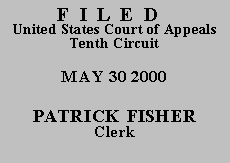

| JESSE L. GARCIA, | No. 99-2268
(D.C. No. CIV 89-1086 JB/JHG) |
In 1989, Mr. Garcia filed a pro se civil rights action pursuant to 42 U.S.C. § 1983, alleging that he had been impermissibly denied access to the law library while an inmate in a New Mexico state penitentiary. The district court dismissed the claim in 1990, but the next year the Tenth Circuit reversed in part and remanded the case to the district court for further proceedings. In 1992, the district court dismissed Mr. Garcia's claim for lack of prosecution, and Mr. Garcia later filed an untimely notice of appeal to this court. We remanded to the district court to determine whether the time for filing a notice of appeal should be reopened under Fed. R. App. P. 4(a)(6). In 1993, the district court entered an order concluding that the time for filing a notice of appeal should not be reopened.
Mr. Garcia alleges that the prison installed a law library to which inmates now have access in response to his lawsuit. In 1999, Mr. Garcia filed an action in the district court contending that he is a "prevailing party" within the meaning of 42 U.S.C. § 1988 and is therefore entitled to fees for his litigation. More specifically, Mr. Garcia claims that he is owed paralegal fees because, he alleges, he holds a diploma as a paralegal.
42 U.S.C. § 1988(b) provides: "In any action or proceeding to enforce a provision of section[] . . . 1983, the court, in its discretion, may allow the prevailing party . . . a reasonable attorney's fee as part of the costs." Assuming without deciding that Mr. Garcia is the prevailing party, that paralegal fees are recoverable, and that his lengthy delay in seeking fees does not bar his claim, Mr. Garcia is nevertheless not entitled to recover fees for his civil rights litigation.
Pro se civil rights plaintiffs are not entitled to recover fees under 42 U.S.C. § 1988. See Turman v. Tuttle, 711 F.2d 148, 149 (10th Cir. 1983). The fact that Mr. Garcia appears to be a paralegal does not affect the result in this case. The Supreme Court has explicitly held that even pro se parties who are themselves attorneys are not entitled to recover fees under 42 U.S.C. § 1988. See Kay v. Ehrler, 499 U.S. 432 (1991). We can conceive of no principled reason to treat paralegal fees differently in this regard.
Accordingly, Mr. Garcia is not entitled to recover fees in this action. The judgment of the district court is therefore AFFIRMED.
ENTERED FOR THE COURT
David M. Ebel
Circuit Judge
*. After examining appellant's brief and the appellate record, this panel has determined unanimously that oral argument would not materially assist the determination of this appeal. See Fed. R. App. P. 34(a)(2) and 10th Cir. R. 34.1(G). The case is therefore ordered submitted without oral argument. This Order and Judgment is not binding precedent, except under the doctrines of law of the case, res judicata, and collateral estoppel. The court generally disfavors the citation of orders and judgments; nevertheless, an order and judgment may be cited under the terms and conditions of 10th Cir. R. 36.3.